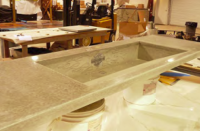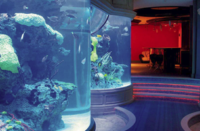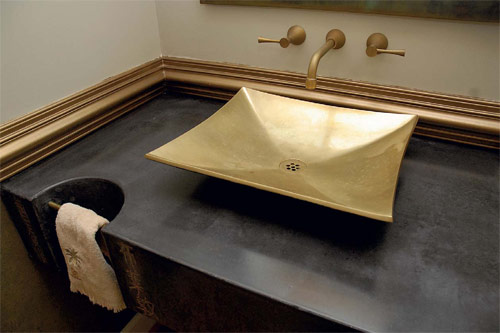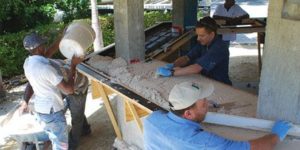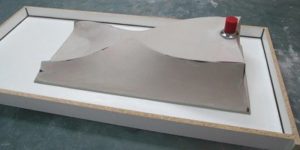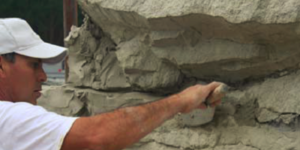Jeremy French doesn’t sound like a big fan of delayed gratification.
“I never finished high school,” he admits, before explaining his transition from landscape designer to the owner of Mandala Design, the high-end concrete design firm he founded in 2004 in Asheville, N.C.
“With landscaping, you have to wait 15 years before it properly grows out and you know what you’ve got,” he says. “I wanted to express myself in a micro way rather than the macro, because I’ve never eased into anything in my life.”
 Thoughts and abstractions and digressions come a mile a minute to the personable and confident concrete artisan. Listeners scratching their heads over his “micro versus macro” comment might also feel they’ve missed a turn somewhere as French explains the Fibonacci sequence, a mathematical formula in which each number is equal to the sum of the preceding two numbers, and how Fibonacci impacted his design of a kitchen island project.
Thoughts and abstractions and digressions come a mile a minute to the personable and confident concrete artisan. Listeners scratching their heads over his “micro versus macro” comment might also feel they’ve missed a turn somewhere as French explains the Fibonacci sequence, a mathematical formula in which each number is equal to the sum of the preceding two numbers, and how Fibonacci impacted his design of a kitchen island project.
French can plunge to cosmic depths at one moment and be glib the next as he shrugs off any suggestion he trained to do decorative concrete. “I don’t know,” he says when asked how he figured out what he was doing in his early days. “I just did it by doing it.”
When asked to undertake a project beyond his level of experience, he says that his standard response is something along this line: “I have no idea how to do it, and I’ll have it to you by the end of the week.”
French is minimizing his own talent, because his custom work in counters, tabletops, vanities, fireplace surrounds, water features – even a 980-pound bathtub – is stunning. Crafted in glass-fiber reinforced concrete (GFRC), the results have the elegance of marble, the power of granite and a delicate artistry all his own.
He’s never advertised, French says, because he’s never had to. And the only result of the economic downswing he’s seen so far in his city of 70,000 is a slight drop-off in commercial work. He’s landed enough residential contracts to make up the shortfall.
“We handle a little high-end new construction, but a lot more of it is remodeling for people who want to or are forced to stay in their homes (by the economy),” he says. French says that he also does a little consulting and production work to help make ends meet.
He had a partner for the first couple years he was in business, but he’s solo these days, except for his half dozen employees. No surprise there. It’s not easy imaging French sharing his abstract vision or cocky spirit with anyone else.
Mathematically speaking, he must feel that he added by subtraction.
